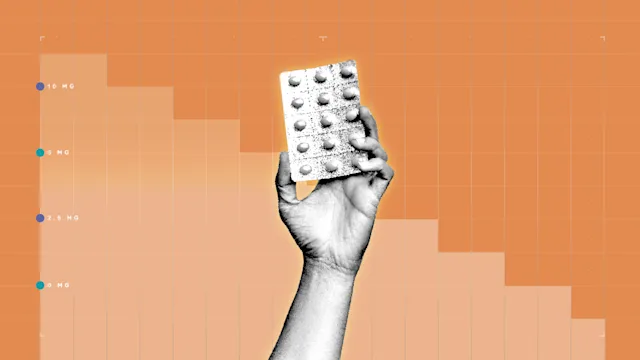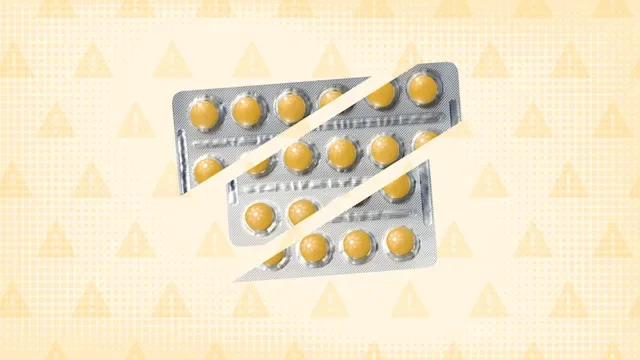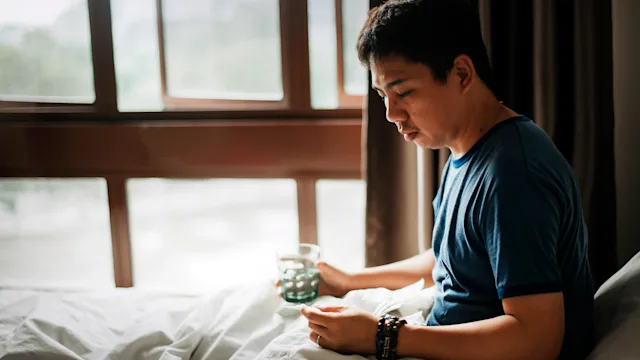Key takeaways:
The best home remedies to help insomnia include meditation, better sleep hygiene practices, and cognitive behavioral therapy.
Over-the-counter medications, like melatonin and diphenhydramine (Benadryl), can also help with sleep. Some research shows that CBD can help as well.
Foods and drinks may also help, including pistachios, turkey, and chamomile tea. While many people use alcohol as a sleep aid, it actually negatively affects sleep quality.
You toss and turn, kick off the covers, then put them back on. You were hoping for a good night’s sleep, but your body just doesn’t want to cooperate. Or maybe you haven’t slept well for a while and you’re worried about serious sleep deprivation.
If this sounds familiar, you’re not alone. In the U.S., 30% to 40% of adults deal with insomnia every year. And most people want to try natural treatments for insomnia before they consider a sleep medication. So we’re here to talk about some home remedies to help with your insomnia.
Home remedies to help you fall asleep
There are quite a few things you can try at home to help with insomnia. Nothing is a quick fix, but the following home remedies have proven to be some of the best ways to treat insomnia. And they’re safer than sleep medications.
Search and compare options
Sleep hygiene
Sleep hygiene refers to lifestyle changes during the day and around your bedtime routine that promote sleep. These common tips will improve your sleep hygiene:
Limit caffeinated products to the morning time.
Get exercise and sunlight during the day.
Try not to nap during the day.
Use your bed for sleep or sexual activities only.
Eat dinner or snacks earlier in the evening, not right before bed.
Avoid TV, computer, and phone screens 1 hour before bed.
Keep the lights low during bedtime.
Create a relaxing bedtime routine that you follow at the same time every night.
Keep your bedroom cool, dark, and quiet while sleeping.
Reduce your tobacco and alcohol consumption.
If you have chronic insomnia, improved sleep hygiene may not be enough to treat your condition. But combining good sleep hygiene with other techniques can be very effective.
Cognitive behavioral therapy for insomnia (CBT-I)
Cognitive behavioral therapy for insomnia (CBT-I) is a sleep-therapy program. It uses exercises and behavioral changes to help you learn to sleep better. CBT-I is so effective at helping people with insomnia that it’s the first-choice recommendation from sleep experts.
CBT-I helps you learn to think about sleep in a positive way. It can also help you shut off any racing thoughts that might be keeping you awake. And it trains your brain to connect being in bed with being asleep.
Some examples of CBT-I techniques are:
Keeping a sleep diary
Setting a consistent bedtime and wake time
Getting out of bed in the night if you’re not sleeping
Making changes to your sleep environment
Using relaxation or biofeedback exercises
Connecting with a therapist is helpful, especially if you’re having anxiety or depression that you think may be contributing to your insomnia as well. But you can do CBT-I on your own. And research shows that this can be just as effective as working with a therapist.
Meditation
People have been practicing meditation and mindfulness for centuries. But the practice has grown in popularity in recent years. There are many wellness benefits to meditation, like improvements in anxiety, depression, and stress. Experts say it also provides some insomnia relief.
Meditation may not increase the amount of time you sleep, but it can improve the quality of your sleep. Check out this list of meditation apps that make it easy and free to meditate at home.
Nonprescription medications you can try for insomnia
Over-the-counter medications can help you fall asleep and stay asleep, especially in the short term. Although there are a lot of products for sleep, many of them contain similar ingredients.
These OTC sleep medications have been shown to shorten the amount of time it takes to fall asleep:
Diphenhydramine (Benadryl): This antihistamine medication is commonly used to treat allergies. One of its side effects is sleepiness, which is why it has become a popular medication for insomnia. It’s also the active ingredient in Tylenol PM and Advil PM.
Doxylamine (Unisom): This is another antihistamine that also causes drowsiness. It’s in Vicks Nyquil Cold and Flu Relief.
It’s important to note that the American Academy of Sleep Medicine does not recommend consistent use of these medications for insomnia. They can become habit forming and have serious side effects.
Natural supplements
There are several natural supplements that can help with sleep. They can help your brain and body relax and get you ready for sleep:
Melatonin: Your brain naturally releases this chemical at nighttime, and it causes you to feel sleepy. So supplementing melatonin can mimic that same feeling. Melatonin is particularly useful when you experience insomnia related to jet lag or shift work.
5-HTP: This is a serotonin-like molecule that your body can convert into melatonin.
Magnesium: This can help with all sorts of conditions. Experts believe magnesium is safe and potentially helpful in insomnia, and it has minimal side effects.
L-theanine: This natural amino acid is found in some teas. It’s believed to relax the brain and help with sleep.
Apigenin: This is a substance in chamomile tea. Apigenin may have benefits in treating insomnia and depression.
Glycine and GABA: These two neurotransmitters are useful in treating insomnia by slowing down brain activity.
CBD
CBD (cannabidiol) is another substance that may help with sleep. It’s extracted from hemp seeds, but it does not have any psychoactive properties like cannabis.
Some research shows that CBD can help with insomnia. By acting on the serotonin system in the brain, CBD may also have a calming effect on the nervous system. This decrease in anxiety may help your sleep as well.
Foods that help with insomnia
Some foods have higher contents of melatonin or similar substances. So eating these close to bedtime may help you fall asleep:
Nuts, like almonds, walnuts, and pistachios
Turkey (think of your nap after Thanksgiving)
Pumpkin seeds
Tart cherry juice
Milk
Some people drink alcohol to help with sleep. But it has the opposite effect. Although alcohol can make you sleepy, it actually interferes with good sleep. Alcohol’s effects on sleep have actually been studied for decades. It interferes with sleep cycles in a way that prevents deep and restful sleep. It can also exacerbate other sleep disorders, like sleep apnea.
The bottom line
Insomnia can be incredibly frustrating. It can have a big effect on your mood and make it difficult to get through the day. If you’re feeling this way, you’re not alone. And the good news is that many of the first-choice treatments for insomnia do not involve medications or prescriptions.
To get better sleep, start by incorporating some sleep-hygiene tips and trying meditation or sleep therapy. If that’s not enough, there are also some over-the-counter medications and supplements that can help. If your insomnia is persistent and does not improve, talk to your provider about other options.

Why trust our experts?

References
Dopheide, J. A. (2020). Insomnia overview: Epidemiology, pathophysiology, diagnosis and monitoring, and nonpharmacologic therapy. American Journal of Managed Care.
Gong, H., et al. (2016). Mindfulness meditation for insomnia: A meta-analysis of randomized controlled trials. Journal of Psychosomatic Research.
Graupensperger, S., et al. (2021). Daily-level effects of alcohol, marijuana, and simultaneous use on young adults’ perceived sleep health. Sleep.
Halson, S. L. (2014). Sleep in elite athletes and nutritional interventions to enhance sleep. Sports Medicine.
Ho, F. Y-Y., et al. (2015). Self-help cognitive-behavioral therapy for insomnia: A meta-analysis of randomized controlled trials. Sleep Medicine Reviews.
Kahn, R. S., et al. (1987). Effect of a serotonin precursor and uptake inhibitor in anxiety disorders: A double-blind comparison of 5-hydroxytryptophan, clomipramine and placebo. International Clinical Pharmacology.
Kaur, H., et al. (2022). Chronic insomnia. StatPearls.
Kawai, N., et al. (2015). The sleep-promoting and hypothermic effects of glycine are mediated by NMDA receptors in the suprachiasmatic nucleus. Neuropsychopharmacology.
Mah, J., et al. (2021). Oral magnesium supplementation for insomnia in older adults: A systematic review & meta-analysis. BMC Complementary Medicine and Therapies.
Matheson, E., et al. (2017). Insomnia: Pharmacologic therapy. American Family Physician.
National Center for Complementary and Integrative Health. (2022). Meditation and mindfulness: What you need to know.
Pacheco, D. (2022). CBD as a sleep aid. Sleep Foundation.
Roehrs, R., et al. (2000). Sleep, sleepiness, and alcohol use. Alcohol Alert.
Salehi, B., et al. (2019). The therapeutic potential of apigenin. International Journal of Molecular Sciences.
Sateia, M. J., et al. (2017). Clinical practice guideline for the pharmacologic treatment of chronic insomnia in adults: An American Academy of Sleep Medicine clinical practice guideline. Journal of Clinical Sleep Medicine.
Shannon, S., et al. (2019). Cannabidiol in anxiety and sleep: A large case series. The Permanente Journal.
Summer, J. (2022). L-theanine for sleep. Sleep Foundation.
Suni, E. (2022). Gaba for sleep. Sleep Foundation.
Zhornitsky, S., et al. (2012). Cannabidol in humans-the quest for therapeutic targets. Pharmaceuticals.



